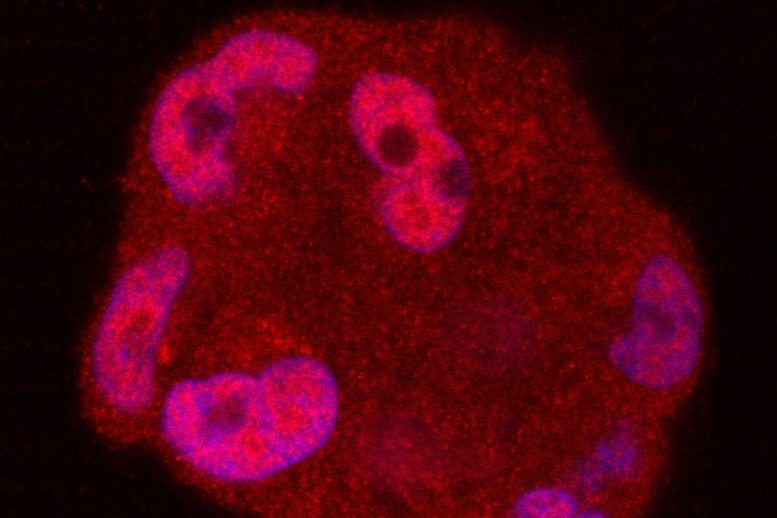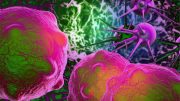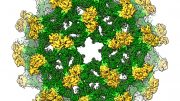
A study from Washington University School of Medicine in St. Louis has identified an RNA molecule that suppresses prostate tumors. According to the research — conducted in mice implanted with human prostate tumor samples — restoring this so-called long noncoding RNA could be a new strategy to treat prostate cancer that has developed resistance to hormonal therapies. Pictured are prostate cancer cells. The androgen receptor is shown in dark red. Cell nuclei are outlined in blue. Credit: Mahajan Lab
RNA molecule suppresses prostate tumor growth.
Many patients with prostate cancer are treated with drugs that lower or block hormones that fuel tumor growth. While the drugs are effective for a time, most patients eventually develop resistance to these therapies.
A new study from Washington University School of Medicine in St. Louis has identified an RNA molecule that suppresses prostate tumors. The scientists found that prostate cancers develop ways to shut down this RNA molecule to allow themselves to grow. According to the new research — conducted in mice implanted with human prostate tumor samples — restoring this so-called long noncoding RNA could be a new strategy to treat prostate cancer that has developed resistance to hormonal therapies.
The study is published today (November 5, 2021) in Cancer Research, a journal of the American Association for Cancer Research.
“The drugs that we have to treat prostate cancer are effective initially, but most patients start developing resistance, and the drugs usually stop working after a year or two,” said senior author Nupam P. Mahajan, PhD, a professor of surgery in the Division of Urologic Surgery. “At that point, the options available for these patients are very limited. We are interested in addressing this need — developing new therapies for patients who have developed resistance — and we believe the RNA molecule we’ve pinpointed may lead to an effective approach.”
The key protein that drives prostate tumor growth, the androgen receptor, binds to testosterone and stimulates cancer growth. Studying the stretch of DNA that codes for the androgen receptor, the researchers discovered that a section of the DNA molecule next to the androgen receptor produced a molecule called a long noncoding RNA. They found that this long noncoding RNA plays a key role in regulating the androgen receptor and vice versa. Because of its position next to the androgen receptor in the genome, the researchers dubbed it NXTAR (next to androgen receptor).
“In prostate cancer, the androgen receptor is very clever,” said Mahajan, who is also a research member of Siteman Cancer Center at Barnes-Jewish Hospital and Washington University School of Medicine. “Our research shows that it suppresses its own suppressor; essentially it binds to NXTAR and shuts it down. This means that in all the prostate cancer samples that we study, we rarely find NXTAR, because it is suppressed by the heavy presence of the androgen receptor in these types of tumors. We discovered NXTAR by using a drug that my lab developed that suppresses the androgen receptor. When the androgen receptor is suppressed, NXTAR starts to appear. When we saw this, we suspected that we had discovered a tumor suppressor.”
The drug, called (R)-9b, was developed to attack a different aspect of prostate cancer biology, knocking down expression of the androgen receptor overall rather than just blocking its ability to bind to testosterone or reducing overall testosterone levels in the body, as currently approved drugs do. But in this study, (R)-9b ended up serving as a tool to reveal the presence and role of NXTAR.
Studying human prostate tumor samples implanted in mice, the researchers showed that restoring NXTAR expression caused the tumors to shrink. They also showed that they didn’t need the entire long noncoding RNA to achieve this effect. One small, key section of the NXTAR molecule is sufficient for shutting down the androgen receptor.
“We are hoping to develop both this (R)-9b drug and NXTAR into new therapies for prostate cancer patients who have developed resistance to the front-line treatments,” Mahajan said. “One possible strategy is to encapsulate the small molecule drug and the key piece of NXTAR into nanoparticles, perhaps into the same nanoparticle, and shut down the androgen receptor in two different ways.”
Mahajan worked with Washington University’s Office of Technology Management to file a patent application on potential uses of NXTAR as therapeutics. In addition, the Moffitt Cancer Center in Tampa, Fla., where Mahajan was a faculty member before joining Washington University, has filed a patent application on the (R)-9b drug. The (R)-9b inhibitor has been licensed to a biotechnology startup company called TechnoGenesys. Mahajan and co-author Kiran Mahajan are co-founders of the company.
Reference: “Loss of long noncoding RNA NXTAR in prostate cancer augments androgen receptor expression and enzalutamide resistance” by Ghildiyal R, Sawant M, Renganathan A, Mahajan K, Kim EH, Luo J, Dang HX, Maher CA, Feng FY, Mahajan NP, 5 November 2021, Cancer Research.
This work was supported by the National Cancer Institute (NCI) of the National Institutes of Health (NIH), grant numbers 1R01CA208258 and 5R01CA227025; the Prostate Cancer Foundation (PCF), grant number 17CHAL06; and the Department of Defense (DOD), grant number W81XWH-21-1-0202.
The (R)-9b inhibitor has been licensed to a biotechnology startup company called TechnoGenesys. Mahajan and co-author Kiran Mahajan are co-founders of the company. They also own stock and serve as consultants to TechnoGenesys.









I have been taking Zytiga for 3 years and semiannual shots of Lupron for my prostate cancer which has metastasized. Initially, my PSA count dropped to .06, but it has now gone up to 2.8. Unless it goes back down, I will gladly volunteer to one of their mice!